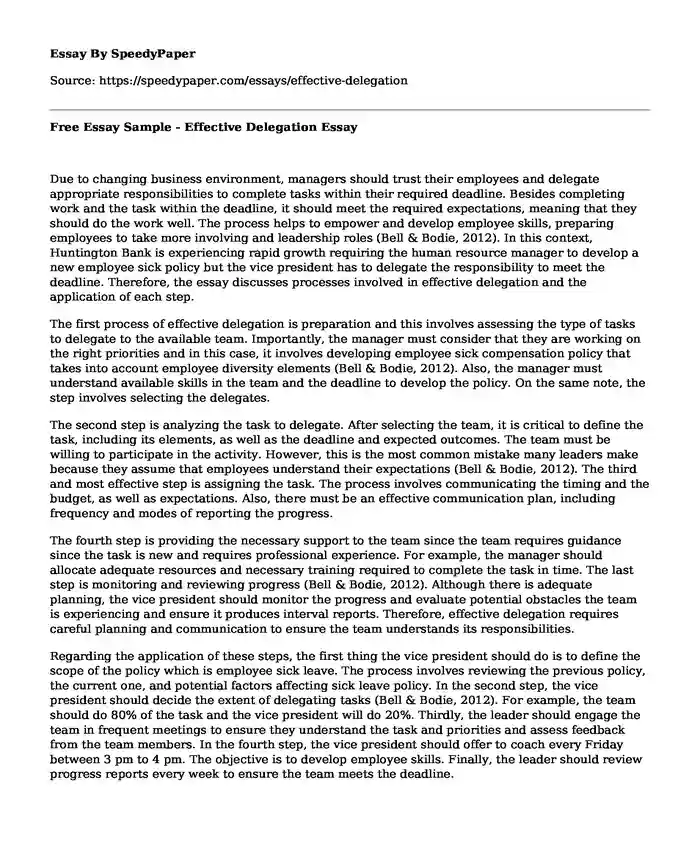
| Essay type: | Evaluation essays |
| Categories: | Human resources Organizational behavior Business management Essays by pagecount |
| Pages: | 3 |
| Wordcount: | 637 words |
Due to changing business environment, managers should trust their employees and delegate appropriate responsibilities to complete tasks within their required deadline. Besides completing work and the task within the deadline, it should meet the required expectations, meaning that they should do the work well. The process helps to empower and develop employee skills, preparing employees to take more involving and leadership roles (Bell & Bodie, 2012). In this context, Huntington Bank is experiencing rapid growth requiring the human resource manager to develop a new employee sick policy but the vice president has to delegate the responsibility to meet the deadline. Therefore, the essay discusses processes involved in effective delegation and the application of each step.
The first process of effective delegation is preparation and this involves assessing the type of tasks to delegate to the available team. Importantly, the manager must consider that they are working on the right priorities and in this case, it involves developing employee sick compensation policy that takes into account employee diversity elements (Bell & Bodie, 2012). Also, the manager must understand available skills in the team and the deadline to develop the policy. On the same note, the step involves selecting the delegates.
The second step is analyzing the task to delegate. After selecting the team, it is critical to define the task, including its elements, as well as the deadline and expected outcomes. The team must be willing to participate in the activity. However, this is the most common mistake many leaders make because they assume that employees understand their expectations (Bell & Bodie, 2012). The third and most effective step is assigning the task. The process involves communicating the timing and the budget, as well as expectations. Also, there must be an effective communication plan, including frequency and modes of reporting the progress.
The fourth step is providing the necessary support to the team since the team requires guidance since the task is new and requires professional experience. For example, the manager should allocate adequate resources and necessary training required to complete the task in time. The last step is monitoring and reviewing progress (Bell & Bodie, 2012). Although there is adequate planning, the vice president should monitor the progress and evaluate potential obstacles the team is experiencing and ensure it produces interval reports. Therefore, effective delegation requires careful planning and communication to ensure the team understands its responsibilities.
Regarding the application of these steps, the first thing the vice president should do is to define the scope of the policy which is employee sick leave. The process involves reviewing the previous policy, the current one, and potential factors affecting sick leave policy. In the second step, the vice president should decide the extent of delegating tasks (Bell & Bodie, 2012). For example, the team should do 80% of the task and the vice president will do 20%. Thirdly, the leader should engage the team in frequent meetings to ensure they understand the task and priorities and assess feedback from the team members. In the fourth step, the vice president should offer to coach every Friday between 3 pm to 4 pm. The objective is to develop employee skills. Finally, the leader should review progress reports every week to ensure the team meets the deadline.
Conclusion
Delegating responsibilities to a team is the most effective way of accomplishing tasks within deadlines and empowering employees. Effective team delegation promotes team capacity and helps to manage time effectively. The process involves identifying and assessing the task, assessing the task, assigning the task, providing the necessary support, and monitoring the entire process. The most important aspect is to ensure appropriate communication among the team members so that they understand their roles and responsibilities.
References
Bell, R., & Bodie, N. (2012). Delegation, authority and responsibility: removing the rhetorical obstructions in the way of an old paradigm. Journal of Leadership, Accountability and Ethics, 9(2), 1-16.
Cite this page
Free Essay Sample - Effective Delegation. (2023, Aug 22). Retrieved from https://speedypaper.net/essays/effective-delegation
Request Removal
If you are the original author of this essay and no longer wish to have it published on the SpeedyPaper website, please click below to request its removal:
- Literary Essay Example: The Sun Also Rises Analysis
- What Is Art - Essay Example
- Free Essay: Investigating the Flood Protection Systems during Hurricane Katrina
- Carbon Credits, Free Essay Example
- Paper Example on Cloud Computing in Higher Learning Centers
- Essay Sample on Human Rights Watch's Policy of Ensuring the ICC's Impartiality
- Free Paper Sample on German Warplane Technology During World Wars
Popular categories




